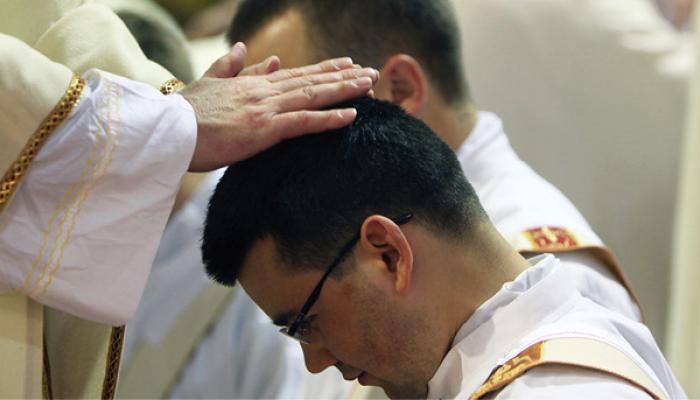
3.43 Why is marriage so important for Christians?
God is the origin of all human love, including the love between a man and a woman who want to get married. A marriage between a baptised man and a baptised woman is precious because Jesus has a special place in their relationship. Jesus therefore elevated marriage to a sacrament.
Marriage has three essential elements:
1) The spouses form a unity together
2) Marriage is for life and cannot be dissolved (Mk. 10:9) Mk. 10:9: Therefore what God has joined together, let man not separate.
3) Children may be born from the marriage, in accordance with God’s command to be fruitful (Gen. 1:28) Gen. 1:28: God blessed them and said to them, “Be fruitful and increase in number; fill the earth and subdue it. Rule over the fish of the sea and the birds of the air and over every living creature that moves on the ground.”
For what ends has God instituted Matrimony?
The marital union of man and woman, which is founded and endowed with its own proper laws by the Creator, is by its very nature ordered to the communion and good of the couple and to the generation and education of children. According to the original divine plan this conjugal union is indissoluble, as Jesus Christ affirmed: “What God has joined together, let no man put asunder” (Mark 10:9). [CCCC 338]
What does the Old Testament teach about marriage?
God helped his people above all through the teaching of the Law and the Prophets to deepen progressively their understanding of the unity and indissolubility of marriage. The nuptial covenant of God with Israel prepared for and prefigured the new covenant established by Jesus Christ the Son of God, with his spouse, the Church. [CCCC 340]
What new element did Christ give to Matrimony?
Christ not only restored the original order of matrimony but raised it to the dignity of a sacrament, giving spouses a special grace to live out their marriage as a symbol of Christ’s love for his bride the Church: “Husbands, love your wives as Christ loves the Church” (Ephesians 5:25). [CCCC 341]
What is required when one of the spouses is not a Catholic?
A mixed marriage (between a Catholic and a baptized non-Catholic) needs for liceity the permission of ecclesiastical authority. In a case of disparity of cult (between a Catholic and a non-baptized person) a dispensation is required for validity. In both cases, it is essential that the spouses do not exclude the acceptance of the essential ends and properties of marriage. It is also necessary for the Catholic party to accept the obligation, of which the non-Catholic party has been advised, to persevere in the faith and to assure the Baptism and Catholic education of their children. [CCCC 345]
Why did God dispose man and woman for each other?
God disposed man and woman for each other so that they might be “no longer two but one” (Mt 19:6). In this way they are to live in love, be fruitful, and thus become a sign of God himself, who is nothing but overflowing love. [Youcat 260]
What is necessary for a Christian, sacramental marriage?
A sacramental marriage has three necessary elements: (a) free consent, (b) the affirmation of a lifelong, exclusive union, and (c) openness to children. The most profound thing about a Christian marriage, however, is the couple’s knowledge: “We are a living image of the love between Christ and the Church.”
The requirement of unity and indissolubility is directed in the first place against polygamy, which Christianity views as a fundamental offense against charity and human rights; it is also directed against what could be called “successive polygamy”, a series of non-binding love affairs that never arrive at one, great, irrevocable commitment. The requirement of marital fidelity entails a willingness to enter a lifelong union, which excludes affairs outside the marriage. The requirement of openness to fertility means that the Christian married couple are willing to accept any children that God may send them. Couples who remain childless are called by God to become “fruitful” in some other way. A marriage in which one of these elements is excluded at the marriage ceremony is not valid. [Youcat 262]
Why is marriage indissoluble?
Marriage is triply indissoluble: first, because the essence of love is mutual self-giving without reservation; second, because it is an image of God’s unconditional faithfulness to his creation; and third, because it represents Christ’s devotion to his Church, even unto death on the Cross.
At a time when 50 percent of marriages in many places end in divorce, every marriage that lasts is a great sign—ultimately a sign for God. On this earth, where so much is relative, people ought to believe in God, who alone is absolute. That is why everything that is not relative is so important: someone who speaks the truth absolutely or is absolutely loyal. Absolute fidelity in marriage is not so much a human achievement as it is a testimony to the faithfulness of God, who is there even when we betray or forget him in so many ways. To be married in the Church means to rely more on God’s help than on one’s own resources of love. [Youcat 263]
Are all people called to marriage?
Not everyone is called to marriage. Even people who live alone can have fulfillment in life. To many of them Jesus shows a special way; he invites them to remain unmarried “for the sake of the kingdom of heaven” (Mt 19:12).
Many people who live alone suffer from loneliness, which they perceive only as a lack and a disadvantage. Yet a person who does not have to care for a spouse or a family also enjoys freedom and independence and has time to do meaningful and important things that a married person would never get to. Maybe it is God’s will that he should care for people for whom no one else cares. Not uncommonly God even calls such a person to be especially close to him. This is the case when one senses a desire to renounce marriage “for the sake of the kingdom of heaven”. Of course a Christian vocation can never mean despising marriage or sexuality. Voluntary celibacy can be practiced only in love and out of love, as a powerful sign that God is more important than anything else. The unmarried person renounces a sexual relationship but not love; full of longing he goes out to meet Christ the bridegroom who is coming (Mt 25:6). [Youcat 265]
How is a Church wedding celebrated?
As a rule a wedding must take place publicly. The bride and bridegroom are questioned as to their intention to marry. The priest or the deacon blesses their rings. The bride and bridegroom exchange rings and mutually promise “to be true in good times and in bad, in sickness and in health” and vow to each other: “I will love you and honor you all the days of my life.” The celebrant ratifies the wedding and administers the blessing.
Here are some excerpts from one form of the Rite of Catholic Marriage: Celebrant: N. and N., have you come here freely and without reservation to give yourselves to each other in marriage?” Bride and bridegroom: “Yes.” Celebrant: “Will you love and honor each other as man and wife for the rest of your lives?” Bride and bridegroom: “Yes.” The celebrant then asks the bride and bridegroom together the following questions. “Will you accept children lovingly from God and bring them up according to the law of Christ and his Church?” Bride and bridegroom: “Yes.” [Youcat 266]
May a husband and wife who are always fighting get a divorce?
The Church has great respect for the ability of a person to keep a promise and to bind himself in lifelong fidelity. She takes people at their word. Every marriage can be endangered by crises. Talking things over together, prayer (together), and often therapeutic counseling as well can open up ways out of the crisis. Above all, remembering that in a sacramental marriage there is always a third party to the bond—Christ—can kindle hope again and again. Someone for whom marriage has become unbearable, however, or who may even be exposed to spiritual or physical violence, may divorce. This is called a “separation from bed and board”, about which the Church must be notified. In these cases, even though the common life is broken off, the marriage remains valid.
Indeed, there are also cases in which the crisis in a marriage ultimately goes back to the fact that one spouse or both was not eligible at the time of the wedding or did not fully consent to the marriage. Then the marriage is invalid in the canonical (legal) sense. In such cases an annulment procedure can be introduced at the diocesan tribunal. [Youcat 269]
In matrimony, let these nuptial blessings be the objects of our love - offspring, fidelity, the sacramental bond. Offspring, not that it be born only, but born again... Fidelity, not such as even unbelievers observe one towards the other, in their ardent love of the flesh... The sacramental bond, again, which is lost neither by divorce nor by adultery, should be guarded by husband and wife with concord and chastity. [St. Augustine, On marriage and concupiscence, Bk. 1, Chap. 11 (ML 44, 424)]





